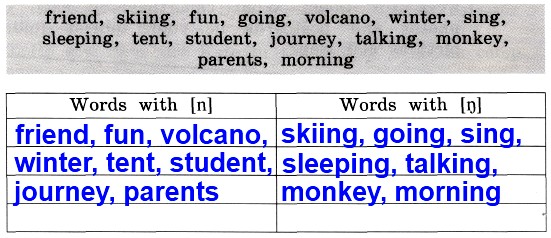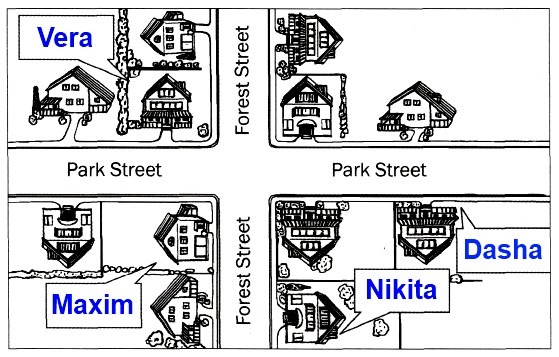Страница 36
A. Read the words. Then fill in the table. – Прочитай слова. Затем заполни таблицу.
Words with [n]
- friend — друг
- fun — веселье
- volcano — вулкан
- winter — зима
- tent — палатка
- student — студент
- journey — путешествие
- parents — родители
Words with [ŋ]
- skiing – катание на лыжах
- going — идти
- sing — петь
- sleeping — спать
- talking — разговаривать
- monkey — обезьяна
- morning – утро
В. Летом наши друзья живут в одном дачном посёлке. Прочитай текст, определи, где чей дом, и напиши имена детей.
Vera lives on Park Street. Maxim lives across the street from Vera. Maxim does not live on Park Street. Dasha lives down the street from Vera, but on the opposite side. Dasha and Nikita live in the same block, but not on the same street. Nikita lives diagonally across the street from Maxim. Vera must cross Park Street to visit Maxim or Nikita.
Вера живет на Парк-стрит. Максим живет через дорогу от Веры. Максим не живет на Парк-стрит. Даша живет вниз по улице от Веры, но на противоположной стороне. Даша и Никита живут в том же блоке, но не на той же улице. Никита живет по диагонали через дорогу от Максима. Вера должна пересечь Парк-стрит, чтобы посетить Максима или Никиту.
Все категории
- Фотография и видеосъемка
- Знания
- Другое
- Гороскопы, магия, гадания
- Общество и политика
- Образование
- Путешествия и туризм
- Искусство и культура
- Города и страны
- Строительство и ремонт
- Работа и карьера
- Спорт
- Стиль и красота
- Юридическая консультация
- Компьютеры и интернет
- Товары и услуги
- Темы для взрослых
- Семья и дом
- Животные и растения
- Еда и кулинария
- Здоровье и медицина
- Авто и мото
- Бизнес и финансы
- Философия, непознанное
- Досуг и развлечения
- Знакомства, любовь, отношения
- Наука и техника
5
Then fill in the table
1 ответ:
0
0
A. Read the words. Then fill in the table. – Прочитайте слова. Затем заполните таблицу.
Words with [n]
friend — друг,
fun — веселье,
volcano — вулкан,
winter — зима,
tent — палатка,
student — студент,
journey — путешествие,
parents — родители
Words with [ŋ]
skiing – катание на лыжах,
going — идти,
sing — петь,
sleeping — спать,
talking — разговаривать,
monkey — обезьяна,
morning – утро
Читайте также
1)I was in Argentina for ten years
2)She was a teacher
3)When you called I was taking shower
4)I was watching TV at 5 o’clock yesterday.
5)Were you sitting here at 8 o’clock in the morning?
6)Was he doing his homework when I came?
1)there were students in the room,and tomorrow there will be many teachers.
2)Will the bus stop?
3)there were no books on the table?
вроде так.
Was there anybody at the stadium? Past Simple
Will there be anybody at the stadium? Future Simple
Отрицание
There wasn’t anybody at the stadium,
There won’t be anybody at the stadium,
Моя подруга небольшая. Она красивая. Она сильная и храбрая. Она не ленивая. У нее короткий нос, глаза — темные. Она может прыгать и танцевать, играть в шахматы. Она любит бананы и апельсины, но не любит ветчину и молоко. В школу мы ходим вместе. Кто она? Как ее зовут? Где она живет? Хотел бы ты познакомиться с моей подругой?
Ответ:
<h2> 5</h2>
1) I am reading
2) He plays
3) Do you get up
4) Are they having
5) We don’t go
6) Dad isn’t watching
<h2> 6</h2>
1) asked
2) Liked
3) Wanted
4) Did they play
5) We didn’t watch
Vocabulary
Label the pictures.
chess
scrabble
dominoes
jigsaw
bowling
darts
backgammon
draughts
Grammar
Put sentences into the boxes.
Present Simple |
Present Continuous |
|---|---|
Are the boys eating chocolate now?
We are playing hide and seek.
Where does she come from?
I’m looking for a new bag.
Do you live in London?
They never eat fast-food.
I like sport.
Jack isn’t watching TV.
He hates playing darts.
Reading
Read the text and fill in the table.
A jigsaw puzzle is a puzzle of oddly shaped pieces. Each piece usually has a small part of a picture on it; when complete, a jigsaw puzzle produces a complete picture.
Jigsaw puzzles were originally created by painting a picture on a flat, rectangular piece of wood, and then cutting that picture into small pieces with a jigsaw. From one to many people can play jigsaw at the same time. John Spilsbury, a London cartographer and engraver, is created jigsaw puzzles around 1760. The world’s largest-sized jigsaw puzzle measured 5,428.8 m2 with 21,600 pieces.
|
Name |
|
|
Date (when appeared) |
|
|
Country (where appeared) |
|
|
Number of players |
|
|
Objective |
one to many
Great Britain
jigsaw
to make a complete picture
1760
Speaking
Put phrases into the correct order.
– I agree.
– No.
– How about chess?
– No. it’s boring.
– No. it’s too logical. I don’t want to think a lot.
– OK.
– Are you doing anything special tonight?
– No. I can never hit the dartboard.
– What about playing a game with me?
– What do you want to play then?
– Let’s play backgammon.
– Let’s play hide and seek. But you will be “it”.
– Why don’t we play darts?
Writing
Fill in the gaps.
To: mary.l@gmail.com
From: kate78@gmail.com
Subject: My favourite game
Hi, !
Glad to hear from you. Thanks for your .
You asked me to write you about my game. It’s . I love it. I like playing it with . And you know you should never choose who to play with. All your friends can join you. Some children don’t like . It means to who hides. But I really like to be “it”. I know all the where they can hide, so, I easily them.
That’s all about my favourite game. What about you? What game do you like to play most of all. Write back.
With love,
secret places
my friends
Kate
find
Mary
favourite
hide and seek
to look for other players
to be “it”
Listening
Listen to children speaking about their favourite games. Match the children to their favourite activities.
Grammar
Choose the correct word/phrase.
- Kim
playing darts.
-
you watching TV.
- They often
to the cinema on Sundays.
-
he still waiting for you?
- My friends
cheat when they play.
-
I seeing the dentist tomorrow?
Grammar
Choose the correct word.
1. We usually … on a picnic every spring.
a. goes b. go c. are going
2. He often …video late at night.
a. watches b. watch c. is watching
3. She … a picture at the moment.
a. draws b. draw c. is drawing
4. Now they … on a stage.
a. performs b. don’t perform c. aren’t performing
5. … he always eat soup?
a. Does b. Do c. Is
6. Where … she going tonight?
a. does b. do c. is
Grammar
Open the brackets.
- We
(work) on a project at the moment. - What
(you/look for)? -
(Olga/learn to play the piano)? - What time
(the lessons/start)? - Mark is very busy. He
(make/a video).
Vocabulary
Highlight the correct definition of each word.
objective – объектив/цель
roll – ролл/сбрасывание
recreational – развлекательный/рекреационный
originate – оригинальный/происходить
blank – чистый/бланк
Grammar
Underline the mistake.
Jack goes to the theatre tomorrow.
We never eats junk food.
Why doesn’t you find a new job?
She is loving listening to pop music.
Kids don’t playing darts now.
Vocabulary
Match synonymous phrases.
Reading
Read the part of the story and choose all the true sentences.
“Hide-and-seek”, or “hide-and-go-seek”, is a popular children’s game in which any number of players conceal themselves in a set environment, to be found by one seeker. The game is played by one player chosen (called as being «it») closing their eyes and counting to a predetermined number while the other players hide. After reaching that number, the player who is «it» calls «Ready or not, here I come!» and then attempts to locate all concealed players. The game ends when the player chosen as «it» locates all players as the players are not allowed to move; the player found last is the winner and is chosen to be «it» in the next game. This game appeared many centuries ago in many countries around the world.
“Hide-and-seek”, or “hide-and-go-seek” is played only in Russia.
The objective of “it” to locate all concealed players.
Concealed players are allowed to move while it is looking for them.
Two chosen players called as being “it” seek players that hide.
Lot of children can play “Hide-and-seek, or hide-and-go-seek” at the same time.
Reading
Read the text about the game and fill in the table.
Scrabble is a word game in which two to four players score points by placing tiles bearing a single letter onto a board divided into a 15×15 grid of squares. The tiles must form words that, in crossword fashion, read left to right in rows or downward in columns, and be included in a standard dictionary or lexicon. In 1938, American architect Alfred Mosher Butts created the game as a variation on an earlier word game he invented called “Lexiko”. The game is sold in 121 countries and is available in 29 languages.
GAME FACT FILE
|
Name |
|
|
Date (when appeared) |
|
|
Country (where appeared) |
|
|
Number of players |
|
|
Objective |
1938
The USA
Scrabble
two to four
form words that, in crossword fashion, read left to right in rows or downward in columns, and be included in a standard dictionary or lexicon to score points


